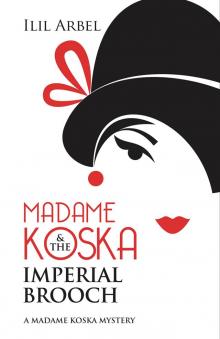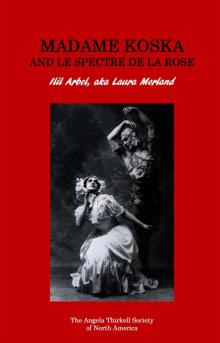- Home
- ILIL ARBEL
Their Exits and their Entrances: The New Chronicles of Barset: Book Two Page 2
Their Exits and their Entrances: The New Chronicles of Barset: Book Two Read online
Page 2
“Lydia and Edmond are on their way, we will have our tea presently,” he said.
“Good, I would appreciate some strengthening after Palmer’s lecture about the sinfulness of my trip to Hollywood,” said Emma, and repeated the conversation, which made Noel laugh. He felt that Emma had much improved since her engagement, was less childish, perhaps, and as for Emma, she had by now forgotten her infatuation with Noel to such an extent that she looked upon him as a benevolent older uncle. Noel, who knew nothing of her previous state of mind or her present one, and probably would not have cared one bit about either, sat by Emma and smiled at her.
“You must be excited, dear. Life had become so full of adventures for you ever since Jessica brought you to Pomfret Towers.”
“Oh, Noel, you cannot begin to imagine,” said Emma. “Apprenticeship in Paris,
meeting Miss Tudor and Mr. Goldwasser, and of course, the very, very best, getting engaged to Edmond! And now we are going to Hollywood! I cannot express my feelings.”
“This trip will be extremely important for both you and Edmond,” Noel said seriously. “Obviously, working on one of Mr. Goldwasser’s films is going to make Edmond’s name. And as for you, I think Miss Tudor is very fond of you, and her help will be invaluable to your career. That is, if you decide to have one. You might choose to devote all your time to your future family.”
“I would like to try my hand at doing both,” said Emma thoughtfully. “I think it will be possible, since Edmond and I are going to work together. Look at my cousins Aubrey and Jessica. They manage very well, having marvellous joint careers and taking excellent care of their children; Edmond and I should at least try for that. Of course, if I find it impossible, my future family will always come first... And yes, Miss Tudor’s help will be very important, and I am so proud of the fact that she likes me. She is an extraordinary person.” She said that in a reverent tone, since she hero-worshipped Glamora ever since she saw the album with the magnificent costumes.
“Indeed,” said Noel politely. He did not like Glamora Tudor, but of course he was not going to be so rude as to say it to Emma. “But Emma, while I am very happy to have you and Edmond here, why didn’t you stay in London with the Clovers and go to the airport on your own?”
“Oh, didn’t you know? Sarah Siddons is measling. So they sent little Harry to his grandmother, with Nurse, and Miss M. is taking care of Sarah Siddons. And what with the last moment rehearsals, and preparations for the new play, we thought Cousin Jessica was just too busy to put up with us. Besides, Mr. Goldwasser said that we cannot be in a house where anyone was sick, even if we both had had the measles.”
Noel smiled. “And while Mr. Goldwasser is always extremely pleasant and polite, when he lays down the law, one obeys his commands, I believe. He has a very forceful personality.”
“Well…” said Emma, loyalty to Mr. Goldwasser preventing her from admitting that Noel was right, but as she could not really deny the accusation, which was entirely true, it amused Noel a great deal.
Lydia came in, followed by Edmond, and started to pour out the tea when Palmer suddenly opened the door, announced, “Mr. Alcott!” and retreated. A little surprised, as she did not expect him, Lydia of course invited him to join them and have some tea. Mr. Alcott sat down, and started toying with the cake and toast in a distracted way. He was quiet and subdued, and despite his lamp-acquired tan, looked rather haggard. Edmond immediately realized that something was bothering Mr. Alcott a great deal. He hoped it was not his calf-love of Glamora, but then it might be worse; he might be losing his nerve with all the excitement. Edmond had always suspected that Mr. Alcott’s character was not very strong. “All right, Alcott,” he said firmly. “What is it?”
“Ah, well,” said Mr. Alcott weakly. “Lady Merton, would it be very rude of me to ask if you have a little orange juice? I need some strengthening, I am afraid.”
“I will go and check,” said Emma. This request for orange juice sounded serious. They all knew how important orange juice was to Mr. Alcott, who needed it at difficult moments that would drive other men to request a stronger drink. The other three sat uncomfortably silent, looking at Mr. Alcott, until Emma came back with a pitcher, and gave Mr. Alcott a full glass.
“Well?” said Noel after Mr. Alcott drank the glass in one huge gulp. He looked considerably better, the colour coming back to his face, and Emma poured him a second glass, which he started sipping with more restraint.
“Mr. Goldwasser cast me in Dance We Shall,” said Mr. Alcott flatly.
“My goodness!” said Lydia. “How exciting!”
“You mean, how terrifying, Lady Merton,” said Mr. Alcott miserably.
“Are you mad? That is what you have always wanted. This film will make you a huge star!” said Edmond. “Why, three films with Miss Tudor, including this giant musical!”
“Well, yes, of course, but I am scared to death,” said Mr. Alcott. “It’s not as if I can drink spiked orange juice every day… how can I do it?”
“But you are a terrific dancer,” said Edmond. “What is the problem?”
“Singing is part of the problem. I never took a single singing lesson in my life. But it’s not just that. It’s Miss Tudor. She doesn’t like me the way she likes you, Keith, and I feel so awkward about it. That is why I came here. I needed to speak to you and ask your advice.”
“So you are still mooning after her?” asked Edmond. “I just don’t understand you. Honestly, when you have this thoroughly attractive young friend, so charming, pretty, and intelligent, how can you waste your life on a married, middle-aged woman?”
“Attractive young friend? Who? Oh, I see. You must mean Maisie Robinson. But Maise and I are just buddies.”
“Oh, come now,” said Lydia. “It’s up to you to change that, if you feel like it. Soon you will be a big star, and everyone will say how handsome you are. Even a level-headed young woman like Miss Robinson is bound to pay attention and start to think about you in a different way, if you would just make the slightest effort. But even if you don’t like her in that way, Edmond is right; you must stop this mad attraction to Glamora Tudor. It will make your life into a misery, you know. It is not worth it.”
“Listen to me, my boy,” said Noel. “I know these things. Flirting with and enjoying the company of a charming lady is one thing. Thinking about her day and night is another. It’s not good for you, and it’s not good for you career. As for the singing, I trust Mr. Goldwasser to set you up with a teacher straight away.”
“He did. I am supposed to meet her as soon as we get to Hollywood. What if she is strict, like Miss Brinton? She will be so intimidating.”
“Look, Alcott, you have to stop fretting about everything so much,” said Edmond sternly. “You have not even met the teacher, and already you are afraid of her. Look at me. I am going to do something rather daunting myself, standing in for Aubrey Clover. Can you imagine doing that? Standing in for the best playwright in England? But I refuse to be intimidated by it. One day at a time, I say.”
“But you are different, Keith. You are, how shall I put it…”
“Stolid?” asked Edmond, grinning.
“Oh, no, Keith! I would never say such a thing about you. You have always been such a pal.”
“But I am stolid. It’s the nature of the Englishman, stiff upper lip and all that.”
“But I thought Americans were strong and silent,” said Lydia, smiling.
“Nah,” said Mr. Alcott. “It’s all pretence. Has something to do with John Wayne’s films, the solitary cowboy thing and all that. Truth is, we are rather nervous people. Think about how quickly we shoot people in these same Westerns! But you are right and I will do my best. Maisie said she will help me out. She will be in Hollywood, as you know, working with Mrs. Rivers on the sequel. And you will help me too, right, Keith? Between the two of you, I will survive this.”
“But what about Miss Tudor? Are you or are you not still in love with her?” asked Edmond.
<
br /> “I don’t think so, Keith. Her being married makes a difference. I still think she is a goddess, the most wonderful woman on earth, of course, but really, it’s just respect and admiration. Naturally I wish that she liked me better, that she felt about me the way she feels about you.”
“She might now, Alcott. What she did not like was your mooning after her,” said Edmond. Noel was impressed with the young man’s insight. “Just so,” he said, considering. “I have a feeling, Alcott, that once you stop persecuting poor Miss Tudor with your unwelcome adoration, she and you will become great friends.”
“Really, that is all I want, Sir Noel. I just need to know she does not resent me for not being Keith. The way she took to Keith, it was truly amazing… Well, I should leave you and let Miss Lover and Keith get ready for the trip.” For Mr. Alcott suddenly realized that he was not necessarily the only person in the world with troubles, plans, and obligations. “So thanks awfully, everyone. My, but this orange juice bucked me up like anything. Did you spike it, Keith?” and his face became radiantly handsome again as he smiled at the company and left.
“This boy will break many hearts,” said Lydia.
“Only when he realizes how attractive he is,” said Noel. “He has no clue to it yet. I do wonder what it will do to his character when the ladies start to show their appreciation. Too much adulation may do much damage to someone like Alcott, who is very nice but not very strong.”
“He is in love with Maisie Robinson,” said Emma. “I am pretty sure of it. But he does not know it, since he imagined himself in love with Miss Tudor for so long.”
“And if heaps of women throw themselves at him after Send Me No Lilies is released, not to mention Dance We Shall, he may never know that he cares for her,” said Lydia. “And since she would be perfect for him, with her strong character and down-to-earth personality, that would be a great pity.”
Chapter Two
The huge white car rolled along merrily on its way to Heathrow Airport. Mr. Goldwasser, Miss Tudor, who we are still not quite used to calling Mrs. Goldwasser but we promise to try, Mrs. Rivers, Emma, Edmond, Maisie, and Mr. Alcott fitted in quite nicely. The chauffeur would later take it back to Norton Hall, and wait with it until the crew returned to film the sequel to Send Me No Lilies which was still unnamed, to Maisie’s chagrin; she simply could not think of a proper name for it yet. “And of course, Sir,” the chauffeur said to Mr. Goldwasser, who was not in the least interested, “I will take her out on the road every other day, to keep her in good condition. It stands to reason she will need some exercise, a sweet little car she is, and I will give her a good polish with my special clorths and wash leather every time, so she won’t be making us ashamed of her.”
Fortunately, Mr. Goldwasser was by then used to the fact that the English lower classes often referred to their cars as if they were females, and therefore did not think that his chauffeur had lost his mind. He was even able to encourage the man by telling him to spare no effort to keep her happy, and followed up with some money that changed hands very comfortably. And so they rode on, each with his or her own feelings about flying over the vast ocean, while the rest of the crew, taking only some of the equipment, were about to board a ship in a week or so.
“Well, well,” said Mr. Goldwasser to no one in particular. “So now I understand what happened.” He was reading something that looked like a wire, but it was so long that most people would not recognize it as such.
“What is it?” asked Glamora.
“I got this wire just before we left Norton Hall and had no time to look at it until now,” said Mr. Goldwasser, looking at her over his spectacles which as usual were riding half down his nose. “It’s from Joe Mammoth. He finally explains why he had to change the dates for the filming so abruptly. It’s the song-and-dance man.”
“Who did you settle on?” asked Maisie curiously.
“We wanted Dennis Stonor. His large-scale choreographed pieces have no match, and Dance We Shall would be just perfect for him. He agreed to take it on, but only if we could fit his schedule, since he is very much in demand and is always extremely busy. This explains everything, I should say, and it’s worth it. Stonor is one of a kind.”
“Mr. Goldwasser, do you know he is a personal friend of my cousin Aubrey?” asked Emma.
“How about that,” said Mr. Goldwasser. “What a small world. I knew he was British, of course, even though he has been working in America for decades. But I had no idea he was Mr. Clover’s friend.”
“More than just a casual friend,” said Edmond, who knew every line in every play that Aubrey Clover wrote, directed, produced, or played in. “They collaborated on a play when Miss Dean was too far into her pregnancy to act.”
“He is extremely talented,” said Mrs. Rivers enthusiastically. “I never met him, but I have heard so much about him from the late Lord Bond. You might know, Mr. Keith, that Lord Bond backed Mr. Stonor’s first ballet, and after that Mr. Stonor went from one success to another.”
“One more Barsetshire connection and I will begin to believe in the supernatural,” said Mr. Goldwasser irritably before Edmond had a chance to answer.
“Yes, it does seem almost impossible,” said Glamora pensively, looking at her fingernails; she was not sure she liked the new colour Miss Dahlia had talked her into, a pale mauve that had no personality at all.
“It was Meant,” said Maisie reverently, and as no one could find an answer to such a statement, the conversation lagged and everyone settled in their seats and looked at the passing scenery, which was really rather beautiful, with varying degrees of boredom.
And this is the right time for a slight divagation, regarding travel. Indeed, as our loyal readers know, we always try to stay close to our beloved Barsetshire. We debated whether perhaps we should let Mr. Goldwasser, Glamora, and Mr. Alcott go to Hollywood for the film, and stay with the rest of our friends in Barsetshire, waiting for their return. They could be assisting Lady Norton in the design of her cactus house and following Maisie and Mrs. Rivers in their attempts to create the sequel. But after serious deliberation we decided that a short foray into the magical land where so many dreams are created, not to mention meeting Denis Stonor, whom we like, on his chosen grounds, would be more interesting to our readers than Lady Norton’s horticultural obsessions. Besides, in Hollywood the sun is more likely to shine, while in Barsetshire it would undoubtedly rain at this time of year, and that decided the issue. We sincerely hope our readers will enjoy the trip.
“This is a fairy tale,” said Emma to Maisie, who was standing next to her, cool and experienced. “It can’t be true.” She was looking at the aeroplanes, standing all in a row, shining and gleaming and perfectly clean; they were so bright she had to shade her eyes with her hand. Maisie laughed. “This is our plane,” she said, pointing at a monster that looked a like a great whale. Pan American Clipper service gave only the best, of course, and Emma stared at the efficient little luggage carts that moved quickly and most efficiently toward the plane with the last bits of luggage. About seventy passengers assembled for their walk to the plane just as the crew rolled the staircase into place. Everyone was elegantly dressed. Even two young girls, aged around nine and six, who stood waiting patiently and politely with their very beautiful mother, wore well-cut little coats, and sported lady-like white gloves and patent leather Mary Janes. Standing below the tall rolling stairway, Emma looked at Miss Tudor’s high heels, and worried about their suitability for such a climb, but she should not have been concerned. As usual, Glamora ignored the peril and went up the stairs with complete ease and comfort. A few beautiful stewardesses, wearing perfectly lovely uniforms that emphasized their tiny waists and petite figures, not to mention the jaunty hats that were tilted over their eyes and made them sparkle, welcomed the passengers aboard. They could have been sisters, they looked so much alike, thought Emma as she looked at them with frank admiration. Noticing how impressed Emma was with the stewardesses, Maisie said, “Would you
believe that these beauties are registered nurses, and that they do the gourmet cooking on board as well? There is no end to these girls’ talents… No wonder they all marry rich passengers or these dashing pilots.”
“And speaking of the pilots, look at this one,” whispered Emma. “Quite good looking, is he not?” The captain was standing next to cockpit, ready to greet his passengers.
“Why, Captain Jordan!” said Glamora. “How delightful to fly with you again.”
“I am very happy to see you, Mrs. Goldwasser,” said the captain. He maintained a completely serious poker face, but could not hide the smile in his blue eyes. Glamora laughed, and Mr. Goldwasser asked, shaking hands with the captain, “So it’s known already by the general public?”
The captain relaxed his attitude and broke into a charming crooked smile, revealing the most beautiful, even, white teeth. “All over the United States, sir, ma’am” he said in a distinctly Southern accent. “The headlines appeared in every blessed newspaper. Things like, ‘Who is the mysterious Mrs. Goldwasser?’ ‘Our Glamora is a married lady!’ and the best one, ‘The Woman Who Cannot Love Has Loved For Over Twenty Years.’ It’s all quite amusing…”
“Well, well,” said Glamora. “As long as they are enjoying it.” They turned to go and the captain said, “Of course it’s all in good fun, Miss Tudor.” Glamora, already walking away, turned and said, “Mrs. Goldwasser, darling…” and gave the captain that special Glamora Tudor glance that involved a very complicated operation. Our intelligent reader must visualize how Glamora’s head had to be turned over the right shoulder, since it was the left hand that held on to Mr. Goldwasser’s arm. The head also had to be slightly lowered, and the eyes looked sideways and up so she could gaze through her eyelashes and meet the captain’s eye at just the right angle. It all took but a second, unlike our attempt to describe it, since as we all know, Glamora was a master of the trade.

 ANCIENT ALIENS: MARRADIANS AND ANUNNAKI: VOLUME ONE: EXTRATERRESTRIAL HOLIDAYS
ANCIENT ALIENS: MARRADIANS AND ANUNNAKI: VOLUME ONE: EXTRATERRESTRIAL HOLIDAYS Ancient Aliens_Marradians and Anunnaki_Volume Two_Extraterrestrial Gods, Religions, and Mystical Practices
Ancient Aliens_Marradians and Anunnaki_Volume Two_Extraterrestrial Gods, Religions, and Mystical Practices Madame Koska & the Imperial Brooch
Madame Koska & the Imperial Brooch Ancient Aliens: Marradians and Anunnaki: Volume Two: Extraterrestrial Gods, Religions, and Mystical Practices
Ancient Aliens: Marradians and Anunnaki: Volume Two: Extraterrestrial Gods, Religions, and Mystical Practices Miss Glamora Tudor!: The New Chronicles of Barset: Book One
Miss Glamora Tudor!: The New Chronicles of Barset: Book One The Cinnabar Box (Guardians of the Earth)
The Cinnabar Box (Guardians of the Earth) Madame Koska and Le Spectre de la Rose
Madame Koska and Le Spectre de la Rose The Lemon Tree
The Lemon Tree Their Exits and their Entrances: The New Chronicles of Barset: Book Two
Their Exits and their Entrances: The New Chronicles of Barset: Book Two